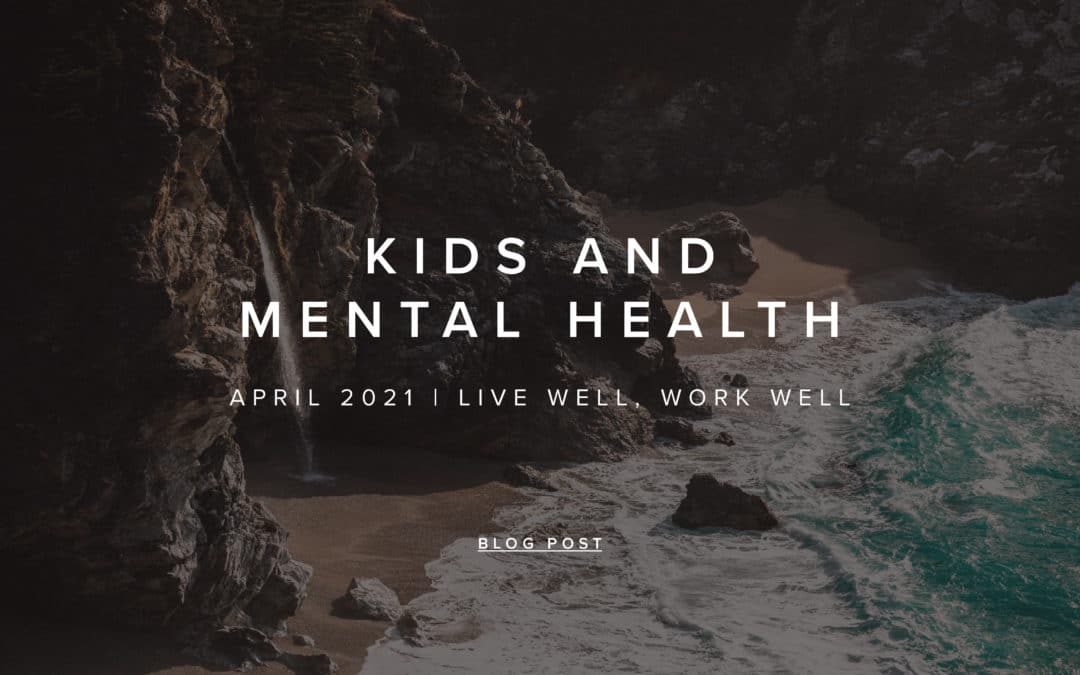The Live Well, Work Well newsletter is an employee newsletter that is produced monthly and covers topics like health, wellness, fitness, nutrition, and personal finance. This month’s issue discusses kids and mental health.
Kids and Mental Health
Kids with good mental health are more likely to meet developmental milestones, feel good about themselves, learn well, have good relationships with their peers, and have an easier time coping with stressors in their lives.
But, according to the Canadian Mental Health Association, at least 10% of children in Canada experience mental health disorders that significantly disrupt their development. The most common mental health disorders in children include:
- Anxiety
- Attention-deficit hyperactivity disorder (ADHD)
- Conduct disorder
- Depression
- Eating disorder
- Obsessive-compulsive disorder (OCD)
- Oppositional defiant disorder
- Post-traumatic stress disorder (PTSD)
- Tourette syndrome
Sometimes children can experience co-morbidity (multiple disorders). But with early intervention and treatment, children can improve and have a happy, successful life.
Signs of mental health issues in children
It’s important for parents to identify signs of mental health issues in kids early, so they can seek the care their child needs to get well. But it’s not always easy to determine if a child’s behaviour is caused by a mental health condition or whether it’s part of being a kid.
Mental health disorders can lead to changes in your child’s ability to learn, behave or cope with their emotions.
Children may go through phases where their behaviour is disrupted, especially when they experience a big change, like moving to a new school, getting a new sibling or the death of a family member. And children, just like adults, experience fears and worries as part of everyday life.
But if your child experiences symptoms that last weeks or months and severely disrupt their quality of life, it’s important to talk to a health professional. Mental health disorders cause persistent and severe symptoms. If your child has any of the following signs, talk to a professional.
- Avoiding friends and social situations
- Avoiding school
- Changes in mood or behaviour
- Difficulty sitting still
- Eating much more or much less than usual
- Extreme irritability or anger
- Frequent headaches or nausea
- Hurting themselves or talking about self-harm
- Frequent tantrums
- Poor grades or difficulty learning
- Sadness that lasts longer than two weeks
- Sleeping less or sleeping more
- Trouble concentrating
- Trouble sleeping
- Talking about their worries, death and/or suicide
- Weight loss or weight gain
If you notice any of these symptoms in your child, check in with them. Talk to your child about how they’re feeling. It can also help to talk to your child’s teachers or other caregivers to see if they have noticed the same problems.
How to help kids improve their mental health
Mental illness and mental health conditions are treatable. First, you can speak with your child’s pediatrician about possible mental health issues. They will help you understand if the symptoms are signs of mental illness or a normal phase of childhood. They can also direct you to resources to help your child.
Children’s mental health disorders are most often treated with psychotherapy. During therapy, kids can learn how to talk about their feelings and how to respond to their emotions. They learn coping skills as well as ways to change their behaviour.
Parents can also support their child’s mental health with these actions:
- Show your child lots of love. Your child needs affection and affirmation that your love is unconditional, and that they are an important and cherished part of the family. Offer your affection and appreciation regularly and make sure your home is a safe haven for them – a place where they feel secure in sharing their feelings.
- Participate in therapy. Parents are sometimes asked to participate in child’s therapy sessions. Participate fully when you are involved. Ask your child’s therapist how you can support their new coping skills while they are at home.
- Manage your own stress. When children have behaviour problems as a result of mental illness, it can place a lot of stress on parents. Learn how to manage your own stress and respond calmly to behaviour problems.
- Praise your child. Help your child see what they are good at by praising them when they do well at school, at sports or home. Nurture confidence and help build their self-esteem. Recognize when they successfully use coping techniques. And provide guidance when they need direction.
- Talk to the school. It’s important that your child’s school counselor and teachers understand any challenges your child is facing. They can make sure school supports are in place to keep your child safe. School is also a common environment for behaviour problems to arise, so it’s important that they know what your child is experiencing so they can offer additional support.
With the help of therapy and supportive parents, children can manage overcome mental health challenges and develop in a positive, healthy manner. Work with your child’s doctor or therapist to learn more about the best ways you can support your child.

